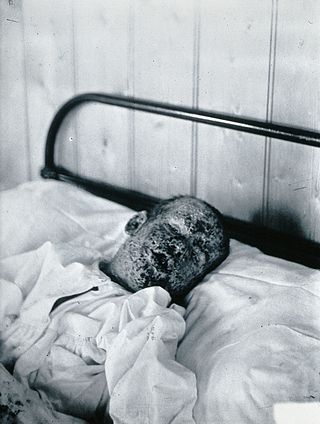Related Research Articles

Lions Clubs International, is an international service organization, currently headquartered in Oak Brook, IL, USA. As of January 2020, it had over 46,000 local clubs and more than 1.4 million members in more than 200 countries and geographic areas around the world.
Tropical diseases are diseases that are prevalent in or unique to tropical and subtropical regions. The diseases are less prevalent in temperate climates, due in part to the occurrence of a cold season, which controls the insect population by forcing hibernation. However, many were present in northern Europe and northern America in the 17th and 18th centuries before modern understanding of disease causation. The initial impetus for tropical medicine was to protect the health of colonial settlers, notably in India under the British Raj. Insects such as mosquitoes and flies are by far the most common disease carrier, or vector. These insects may carry a parasite, bacterium or virus that is infectious to humans and animals. Most often disease is transmitted by an insect bite, which causes transmission of the infectious agent through subcutaneous blood exchange. Vaccines are not available for most of the diseases listed here, and many do not have cures.
Lepra (Leprosy Relief Association) is a UK-based international charity established in 1924, working to diagnose, treat, and rehabilitate people with leprosy. Lepra currently works in India, Bangladesh, and Zimbabwe.
An advance market commitment (AMC) is a promise to buy or subsidise a product if it is successfully developed. AMCs are typically offered by governments or private foundations to encourage the development of vaccines or treatments. In exchange, pharmaceutical companies commit to providing a certain number of doses at a fixed price. This funding mechanism is used when the cost of research and development is too high to be worthwhile for the private sector without a guarantee of a certain quantity of purchases.

Global health is the health of the populations in the worldwide context; it has been defined as "the area of study, research, and practice that places a priority on improving health and achieving equity in health for all people worldwide". Problems that transcend national borders or have a global political and economic impact are often emphasized. Thus, global health is about worldwide health improvement, reduction of disparities, and protection against global threats that disregard national borders, including the most common causes of human death and years of life lost from a global perspective.

Neglected tropical diseases (NTDs) are a diverse group of tropical infections that are common in low-income populations in developing regions of Africa, Asia, and the Americas. They are caused by a variety of pathogens, such as viruses, bacteria, protozoa, and parasitic worms (helminths). These diseases are contrasted with the "big three" infectious diseases, which generally receive greater treatment and research funding. In sub-Saharan Africa, the effect of neglected tropical diseases as a group is comparable to that of malaria and tuberculosis. NTD co-infection can also make HIV/AIDS and tuberculosis more deadly.
The Global Network for Neglected Tropical Diseases is an advocacy initiative of the Sabin Vaccine Institute dedicated to raising the awareness, political will, and funding necessary to control and eliminate the most common Neglected Tropical Diseases (NTDs)—a group of disabling, disfiguring, and deadly diseases affecting more than 1.4 billion people worldwide living on less than $1.25 a day.

The eradication of infectious diseases is the reduction of the prevalence of an infectious disease in the global host population to zero.
The Children's Investment Fund Foundation (UK) (CIFF) is an independent philanthropic organisation with offices in Addis Ababa, Beijing, London, Nairobi and New Delhi. It is a registered charity in England and Wales and in 2021 disbursed $468 million and committed $772 million in charitable investments. With assets of GBP £5.2 billion (USD $6.6 billion), it is the 5th largest global development philanthropy in the world based on annual disbursements. According to OECD published data, it is the world's second largest private funder of reproductive health and environmental protection globally and the largest philanthropy that focuses specifically on improving children's lives. In 2021, CIFF pledged $500 million towards gender equality over five years as part of the generation equality forum.
The Task Force for Global Health is an international, nonprofit organization that works to improve health of people most in need, primarily in developing countries. Founded in 1984 by global health pioneer Dr. William Foege, The Task Force consists of eight programs focused on neglected tropical diseases, vaccines, field epidemiology, public health informatics, and health workforce development. Those programs include the African Health Workforce Project, the Center for Vaccine Equity, Children Without Worms, International Trachoma Initiative, Mectizan Donation Program, Neglected Tropical Diseases Support Center, Public Health Informatics Institute, and TEPHINET. The Task Force works in partnership with ministries of health and hundreds of organizations, including major pharmaceutical companies that donate billions of dollars annually in essential medicines. Major funders include the Bill & Melinda Gates Foundation, CDC, WHO, Robert Wood Johnson Foundation, de Beaumont Foundation, United States Agency for International Development, Sightsavers, Pfizer, Merck & Co., Johnson & Johnson, and GlaxoSmithKline. The Task Force is affiliated with Emory University, headquartered in Decatur, Georgia, a town in metro Atlanta, and has regional offices in Guatemala and Ethiopia. The Task Force currently supports work in 154 countries.
The London Declaration on Neglected Tropical Diseases was a collaborative disease eradication programme launched on 30 January 2012 in London. It was inspired by the World Health Organization roadmap to eradicate or prevent transmission for neglected tropical diseases by the year 2020. Officials from WHO, the World Bank, the Bill & Melinda Gates Foundation, the world's 13 leading pharmaceutical companies, and government representatives from US, UK, United Arab Emirates, Bangladesh, Brazil, Mozambique and Tanzania participated in a joint meeting at the Royal College of Physicians to launch this project. The meeting was spearheaded by Margaret Chan, Director-General of WHO, and Bill Gates, Co-Chair of the Bill & Melinda Gates Foundation.
Children Without Worms (CWW) is a program of the Task Force for Global Health and envisions a world in which all at-risk people, specifically targeting children, are healthy and free of worm infections (helminthiases) so they can develop to their full potential. To accomplish the vision of a worm-free world, CWW works closely with the World Health Organization, national Ministries of Health, nongovernmental organizations and private-public coalitions such as Uniting to Combat NTDs. It acts as an intermediary for the pharmaceutical company Johnson and Johnson in distributing the latter's mebendazole for mass deworming of children to reduce or end soil-transmitted helminthiasis.
Mundo Sano, or Fundación Mundo Sano, is a scientific, nongovernmental foundation in Argentina working for the prevention and control of communicable diseases such as dengue fever, Chagas disease, malaria, leishmaniasis and soil-transmitted helminthiasis. Its main objective is to facilitate equal access to health and welfare among people who are vulnerable to these otherwise avoidable diseases, mainly by promoting strategic policies for the improvement of the quality of life of affected communities.
The Global Health Innovative Technology Fund, headquartered in Japan, is an international public-private partnership between the Government of Japan, 16 pharmaceutical and diagnostics companies, the Bill & Melinda Gates Foundation, the Wellcome Trust and United Nations Development Programme. It funds scientific research and development for anti-infectives and diagnostics for diseases that primarily affect the developing world. Bill Gates has noted that "GHIT draws on the immense innovation capacity of Japan’s pharmaceutical companies, universities and research institutions to accelerate the creation of new vaccines, drugs and diagnostic tools for global health." Margaret Chan, former Director-General of the World Health Organization, said: "The GHIT Fund has stepped in to provide that incentive in a pioneering model of partnership that brings Japanese innovation, investment and leadership to the global fight against infectious disease."
This is a timeline of deworming, and specifically mass deworming.

Eradication of dracunculiasis is an ongoing program. Dracunculiasis, or Guinea worm disease, is an infection by the Guinea worm. In 1986, there were an estimated 3.5 million cases of Guinea worm in 20 endemic nations in Asia and Africa. Ghana alone reported 180 000 cases in 1989. The number of cases has since been reduced by more than 99.999 % to 13 in 2023 in five remaining endemic states: South Sudan, Chad, Mali, Ethiopia and Angola.
Neglected tropical diseases in India are a group of bacterial, parasitic, viral, and fungal infections that are common in low income countries but receive little funding to address them. Neglected tropical diseases are common in India.
World NTD Day or World NTD Day is an awareness day for addressing neglected tropical diseases (NTDs). It is held on January 30 annually.

Chinyere Ukaga is a professor of public health parasitology in the department of Animal and Environmental Biology, Imo State University, Owerri.
The END Fund is a private non-profit organisation dedicated to combating the five most common neglected tropical diseases (NTDs) that cause up to 90% of the NTD burden in Sub-Saharan Africa.
References
- 1 2 Mutapi, Francisca (2022-08-29). "A new roadmap for neglected tropical diseases". Nature. doi:10.1038/d44148-022-00125-5 (inactive 31 January 2024).
{{cite journal}}: CS1 maint: DOI inactive as of January 2024 (link) - 1 2 3 4 5 Burki, Talha (2022-07-02). "New declaration on neglected tropical diseases endorsed". Lancet. 400 (10345): 15. doi:10.1016/S0140-6736(22)01237-5. PMID 35780782. S2CID 250150750.
- 1 2 3 "Commonwealth leaders recommit to ending malaria and neglected tropical diseases". www.who.int. 2022-06-23. Retrieved 2022-12-29.
- ↑ Hotez, Peter J.; Aksoy, Serap; Brindley, Paul J.; Kamhawi, Shaden (2020). "What constitutes a neglected tropical disease?". PLOS Neglected Tropical Diseases. 14 (1): e0008001. doi: 10.1371/journal.pntd.0008001 . ISSN 1935-2735. PMC 6991948 . PMID 31999732.
- ↑ Álvarez-Hernández, Diego-Abelardo; Rivero-Zambrano, Luisa; Martínez-Juárez, Luis-Alberto; García-Rodríguez-Arana, Rodolfo (2020). "Overcoming the global burden of neglected tropical diseases". Therapeutic Advances in Infectious Disease. 7: 2049936120966449. doi:10.1177/2049936120966449. ISSN 2049-9361. PMC 7592315 . PMID 33178435.
- ↑ Engels, Dirk; Zhou, Xiao-Nong (2020-01-28). "Neglected tropical diseases: an effective global response to local poverty-related disease priorities". Infectious Diseases of Poverty. 9 (1): 10. doi: 10.1186/s40249-020-0630-9 . ISSN 2049-9957. PMC 6986060 . PMID 31987053.
- 1 2 3 Cao, Isabella (2022-11-02). "The Kigali Summit: NTDs and Humanity's Race Against Its Silent Killer". Harvard International Review. Retrieved 2023-01-03.
- 1 2 "African Union pledges to end neglected tropical diseases By 2030". Namibia Economist. 2022-03-31. Retrieved 2023-01-03.
- ↑ WHO (3 February 2012). "WHO roadmap inspires unprecedented support to defeat neglected tropical diseases". who.int. World Health Organization, Geneva. Archived from the original on April 7, 2014. Retrieved 2013-05-29.
- ↑ Uniting to Combat NTDs (2012). "Endorsements (endorsing organizations)". unitingtocombatntds.org. Uniting to Combat Neglected Tropical Diseases. Archived from the original on 2013-05-25. Retrieved 2013-05-30.
- ↑ The Lancet (2022-01-29). "Neglected tropical diseases: ending the neglect of populations". Lancet. 399 (10323): 411. doi: 10.1016/S0140-6736(22)00161-1 . PMID 35093213. S2CID 246403390.
- ↑ Hopkins, Donald R.; Ruiz-Tiben, Ernesto; Eberhard, Mark L.; Weiss, Adam; Withers, P. Craig; Roy, Sharon L.; Sienko, Dean G. (2018). "Dracunculiasis Eradication: Are We There Yet?". The American Journal of Tropical Medicine and Hygiene. 99 (2): 388–395. doi:10.4269/ajtmh.18-0204. ISSN 1476-1645. PMC 6090361 . PMID 29869608.
- ↑ Burki, Talha (2022-07-02). "New declaration on neglected tropical diseases endorsed". Lancet. 400 (10345): 15. doi:10.1016/S0140-6736(22)01237-5. PMID 35780782. S2CID 250150750.
- 1 2 Hassan, Samia Suluhu (2022-06-14). "We Can End Neglected Tropical Diseases". Project Syndicate. Retrieved 2023-01-03.
- ↑ Malecela, Mwelecele N.; Ducker, Camilla (2021-01-28). "A road map for neglected tropical diseases 2021-2030". Transactions of the Royal Society of Tropical Medicine and Hygiene. 115 (2): 121–123. doi:10.1093/trstmh/trab002. ISSN 1878-3503. PMC 7842088 . PMID 33508095.
- ↑ "The Kigali Declaration – your invitation to feedback on the draft declaration". GSA. Retrieved 2023-01-03.
- ↑ Elphick-Pooley, Thoko; Engels, Dirk; Uniting to Combat NTDs (2022-01-28). "World NTD Day 2022 and a new Kigali Declaration to galvanise commitment to end neglected tropical diseases". Infectious Diseases of Poverty. 11 (1): 2. doi: 10.1186/s40249-021-00932-2 . PMC 8794616 . PMID 35086566.
- ↑ Davey, Gail (2022-01-28). "Putting our principles into practice on Neglected Tropical Diseases". www.nihr.ac.uk. Retrieved 2023-01-03.
- ↑ "Global leaders unite to pledge commitments to end NTDs". Uniting to Combat NTDs. 2022-01-27. Retrieved 2023-01-03.
- ↑ "Improve resistance to neglected tropical diseases, WHO urges". UN News. 2022-01-30. Retrieved 2023-01-03.
- ↑ "AU pledges to end neglected tropical diseases by 2030". The Chronicle. 2022-04-04. Retrieved 2023-01-03.
- 1 2 "The Kigali Declaration". Uniting to Combat NTDs. Retrieved 2023-01-03.
- 1 2 3 4 5 Jesudason, Timothy (2022). "Global commitment to action on NTDs and malaria". The Lancet. 22 (9): 1285. doi:10.1016/S1473-3099(22)00539-4. ISSN 1474-4457. PMID 36029786. S2CID 251820451.
- ↑ "The Declaration". Uniting to Combat NTDs. Retrieved 2023-01-03.
- 1 2 Balfour, Hannah (2022-06-27). "Healthier Together and philanthropic ventures in tropical disease". European Pharmaceutical Review. Retrieved 2023-01-03.
- ↑ "Novartis Renews Commitment to Neglected Tropical Disease and Malaria Elimination, Investing USD 250 Million over Five Years to Research and Develop New Treatments". The Guardian Nigeria News - Nigeria and World News. 2022-06-23. Retrieved 2023-01-03.
- ↑ Mussro, Jessica (2022-06-21). "116-Year-Old Organization Renews Commitment to Fight Neglected Tropical Diseases by Signing Kigali Declaration". American Leprosy Missions. Retrieved 2023-01-03.
- ↑ "Fighting Neglected Tropical Diseases". Bayer. Retrieved 2023-01-03.
- ↑ "Bill & Melinda Gates Foundation Announces New Commitments in Support of African Leadership Driving to End Malaria and Neglected Tropical Diseases". Bill & Melinda Gates Foundation. 2022-06-23. Retrieved 2023-01-03.
- ↑ "DNDi's Commitment to the Kigali Declaration | DNDi" (PDF). dndi.org. 2022-06-20. Retrieved 2023-01-03.
- ↑ Nirula, Anjay (2022-06-20). "Canadian organization calls on other actors to join a global fight". EIN Presswire. Retrieved 2023-01-03.
- ↑ "Eisai Signs the Public-Private Partnership "Kigali Declaration" for Eliminating Neglected Tropical Diseases". Eisai Co., Ltd. Retrieved 2023-01-03.
- ↑ "Gilead Endorses The Kigali Declaration On Preventing, Controlling and Eliminating Neglected Tropical Diseases". www.gilead.com. Retrieved 2023-01-03.
- ↑ "Johnson & Johnson Renews Commitment to Fight Neglected Tropical Diseases, Investing in Beating Intestinal Worms, Dengue and Leprosy". Johnson & Johnson. 23 June 2022. Retrieved 2023-01-03.
- ↑ "Lepra signs the Kigali Declaration - LEPRA". www.lepra.org.uk. 2022-07-13. Retrieved 2023-01-03.